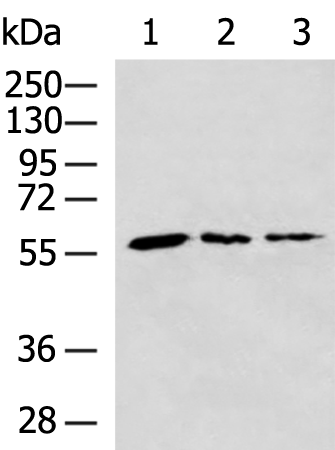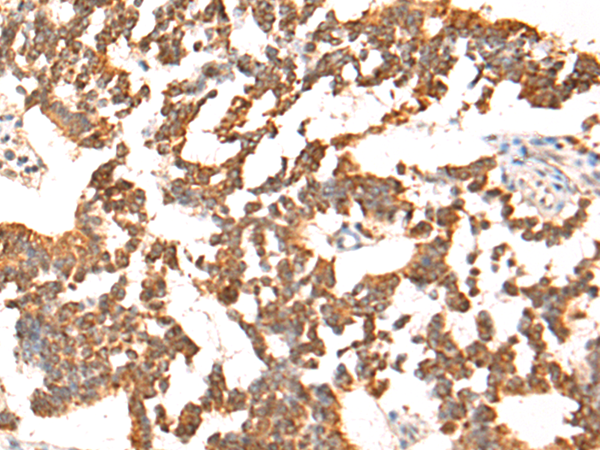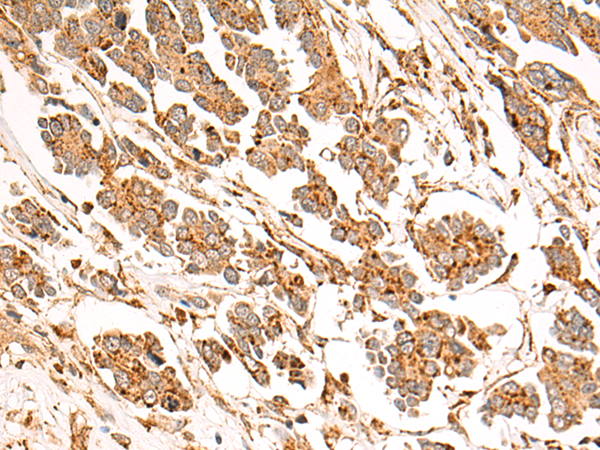


| WB | 咨询技术 | Human,Mouse,Rat |
| IF | 咨询技术 | Human,Mouse,Rat |
| IHC | 1/50-1/200 | Human,Mouse,Rat |
| ICC | 技术咨询 | Human,Mouse,Rat |
| FCM | 咨询技术 | Human,Mouse,Rat |
| Elisa | 1/5000-1/10000 | Human,Mouse,Rat |
| Aliases | AGM1; PAGM; IMD23; PGM 3 |
| WB Predicted band size | 60 kDa |
| Host/Isotype | Rabbit IgG |
| Antibody Type | Primary antibody |
| Storage | Store at 4°C short term. Aliquot and store at -20°C long term. Avoid freeze/thaw cycles. |
| Species Reactivity | Human, Mouse |
| Immunogen | Fusion protein of human PGM3 |
| Formulation | Purified antibody in PBS with 0.05% sodium azide and 50% glycerol. |
+ +
以下是关于PGM3抗体的3篇代表性文献示例(注:具体内容需通过学术数据库验证):
1. **文献名称**:*Autoantibodies against PGM3 in primary immunodeficiency disorders*
**作者**:Zhang Y, et al.
**摘要**:该研究报道了在部分原发性免疫缺陷患者血清中检测到抗PGM3自身抗体,并发现这些抗体可能与异常的糖代谢及免疫细胞功能紊乱相关,提示其在疾病诊断中的潜在生物标志物作用。
2. **文献名称**:*PGM3 mutations and autoimmune manifestations in patients with severe congenital neutropenia*
**作者**:Saito M, et al.
**摘要**:研究分析了PGM3基因突变与先天性中性粒细胞减少症患者中自身免疫症状的关联,发现部分患者存在针对PGM3的自身抗体,可能与免疫系统异常激活和炎症反应加剧有关。
3. **文献名称**:*Role of anti-PGM3 antibodies in modulating glycosylation pathways*
**作者**:Chao LY, et al.
**摘要**:通过体外实验证明,抗PGM3抗体会干扰酶活性,影响蛋白质N-糖基化过程,可能导致细胞信号传导异常,为理解自身免疫性疾病中代谢-免疫交叉机制提供了新视角。
**提示**:以上为示例性整理,建议通过PubMed或Google Scholar以“PGM3 antibody”或“anti-PGM3 autoantibody”为关键词检索最新文献以获取准确信息。
**Background of PGM3 Antibodies**
Phosphoglucomutase 3 (PGM3) is an enzyme critical in the glycosylation pathway, catalyzing the conversion of N-acetylglucosamine (GlcNAc)-6-phosphate to GlcNAc-1-phosphate. This step is essential for synthesizing UDP-GlcNAc, a key substrate for N-linked and O-linked glycoprotein modifications. PGM3 deficiency, caused by autosomal recessive hypomorphic mutations, disrupts glycosylation and is linked to a congenital disorder of glycosylation (PGM3-CDG). This condition manifests as severe immune dysregulation, including recurrent infections, autoimmune phenomena, and atopic disorders.
PGM3 autoantibodies have recently emerged as biomarkers in autoimmune and inflammatory diseases. Studies report elevated PGM3 antibody levels in subsets of patients with systemic lupus erythematosus (SLE), rheumatoid arthritis (RA), and other autoimmune conditions. These autoantibodies may arise from aberrant immune responses to improperly glycosylated proteins, a hallmark of PGM3 dysfunction. Additionally, PGM3 antibodies are explored in cancer research, as altered glycosylation is common in malignancies.
Research on PGM3 antibodies aims to clarify their pathogenic role—whether they contribute to disease progression or are secondary to underlying glycosylation defects. Their clinical utility as diagnostic or prognostic tools remains under investigation. Understanding PGM3-related pathways and autoimmunity may unveil novel therapeutic targets for immune-mediated diseases.
×